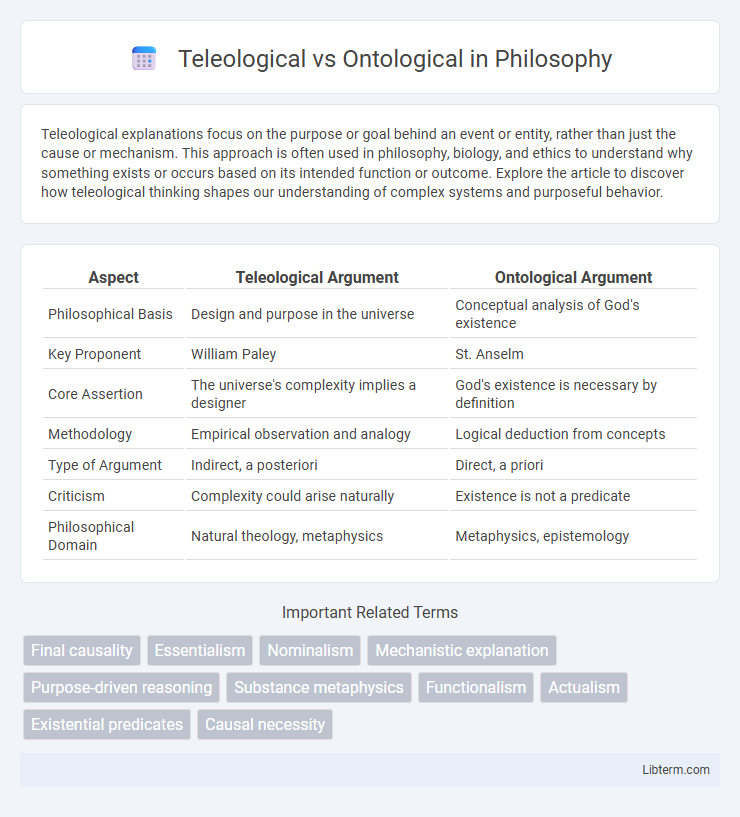Teleological explanations focus on the purpose or goal behind an event or entity, rather than just the cause or mechanism. This approach is often used in philosophy, biology, and ethics to understand why something exists or occurs based on its intended function or outcome. Explore the article to discover how teleological thinking shapes our understanding of complex systems and purposeful behavior.
Table of Comparison
| Aspect | Teleological Argument | Ontological Argument |
|---|---|---|
| Philosophical Basis | Design and purpose in the universe | Conceptual analysis of God's existence |
| Key Proponent | William Paley | St. Anselm |
| Core Assertion | The universe's complexity implies a designer | God's existence is necessary by definition |
| Methodology | Empirical observation and analogy | Logical deduction from concepts |
| Type of Argument | Indirect, a posteriori | Direct, a priori |
| Criticism | Complexity could arise naturally | Existence is not a predicate |
| Philosophical Domain | Natural theology, metaphysics | Metaphysics, epistemology |
Introduction to Teleological and Ontological Concepts
Teleological concepts emphasize purpose and design as explanations for phenomena, often linking causality to intended outcomes within philosophical and theological contexts. Ontological concepts focus on the nature of being and existence, exploring what entities are and their fundamental properties regardless of purpose. These frameworks shape distinct approaches in philosophy, metaphysics, and ethics by addressing why things exist versus how they exist.
Defining Teleology: Purpose and Ends
Teleology centers on the concept that natural phenomena and entities have inherent purposes or ultimate ends guiding their existence and behavior. This philosophical approach emphasizes that causation is driven by goals or final causes rather than merely by preceding events or material conditions. By defining teleology through purpose and ends, it contrasts with ontological frameworks that prioritize being and existence over functional objectives.
Understanding Ontology: Nature of Being
Ontology explores the nature of being by examining existence, reality, and the categories that define entities. It seeks to understand what it means to be and the fundamental structures underlying all that exists. Teleological explanations, in contrast, focus on purpose or end-goals, whereas ontology centers on the essence and nature of being itself.
Historical Origins and Philosophical Roots
Teleological arguments trace back to ancient Greek philosophers like Aristotle, who emphasized purpose and design in nature as evidence for a guiding intelligence. Ontological arguments originated with Saint Anselm in the 11th century, relying on abstract reasoning and definition-based proof of God's existence. Both arguments represent foundational pillars in classical theistic philosophy, shaping centuries of metaphysical and theological discourse.
Key Differences Between Teleological and Ontological Approaches
Teleological approaches emphasize purpose and final causes, focusing on outcomes and goals as the primary explanation for phenomena, often used in ethics and biology to interpret actions or features based on their end results. Ontological approaches concentrate on the nature of being and existence itself, addressing the fundamental categories and relationships that constitute reality without referencing purposes or goals. The key difference lies in teleology's goal-oriented perspective contrasting with ontology's concern with what entities are and how they fundamentally exist.
Major Figures and Influences in Teleology and Ontology
St. Thomas Aquinas stands as a central figure in teleology, integrating Aristotelian purpose-driven explanations into Christian theology, while Immanuel Kant significantly influenced ontology through his critical examination of being and knowledge, emphasizing a priori conditions of experience. Aristotle's concept of final causes laid the foundation for teleological thought, asserting that natural phenomena have inherent purposes. Ontology was profoundly shaped by Martin Heidegger, who redefined the study of being by exploring existential dimensions and human experience, influencing contemporary metaphysics.
Applications in Science and Philosophy
Teleological arguments in science and philosophy emphasize purpose-driven explanations, commonly applied in biology to interpret adaptive traits and evolutionary processes. Ontological frameworks prioritize the study of beings and existence itself, central to metaphysics and foundational theories in quantum physics and cosmology. Scientific methodologies often integrate teleological reasoning for functional analysis, while ontological perspectives guide conceptual clarifications and theoretical models in philosophy.
Teleological vs Ontological Ethics
Teleological ethics evaluates morality based on the consequences or outcomes of actions, prioritizing the end results to determine right from wrong, as seen in utilitarianism. Ontological ethics, rooted in the nature of beings and intrinsic properties, assesses morality through adherence to inherent duties, principles, or categorical imperatives regardless of consequences. The distinction highlights teleological focus on practical impacts versus ontological emphasis on inherent moral values and duties.
Contemporary Debates and Perspectives
Contemporary debates on teleological versus ontological arguments concentrate on their relevance in modern philosophy of religion and metaphysics, with scholars assessing teleological arguments' appeal to empirical evidence in design and purpose against ontological arguments' reliance on a priori logic and necessary existence. Critics of teleological perspectives emphasize the problem of natural evil and evolutionary explanations challenging purposeful design, while defenders highlight advancements in fine-tuning arguments and cosmic conditions supporting theism. Ontological arguments are scrutinized in light of modal logic developments and existential quantification, provoking ongoing discussion on whether conceptual necessity suffices for proving God's existence without empirical grounding.
Conclusion: Integrating Teleological and Ontological Views
Integrating teleological and ontological views enhances philosophical inquiry by uniting purpose-driven explanations with the nature of being, creating a holistic understanding of existence. This synthesis allows for a comprehensive framework where the reasons behind phenomena (teleology) align with their fundamental essence (ontology), fostering deeper insight into reality. Such integration supports multidimensional analysis, enriching metaphysical and ethical discussions alike.
Teleological Infographic

 libterm.com
libterm.com